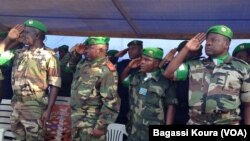A new U.N. peacekeeping mission is underway in the Central African Republic, one of Africa's poorest and most fragile states, amid doubts over what peace there is to keep.
This week 1,500 troops from Morocco, Pakistan, Bangladesh and Indonesia, among other nations, join 4,800 African troops already deployed in the Central African Republic. A ceremony at the M’poko airport in the capital Bangui marked the official transition from the African force, known as MISCA, to the U.N. peacekeeping mission, MINUSCA.
“It does not matter who changes their berets first, you all get to be in the U.N. mission,” said force commander, Cameroonian general Martin Tumenta, bringing down laughter as he reprimanded a group of soldiers who were a little too eager to change their green military berets into the U.N. light blue hats.
The U.N. Security Council has called for 12,000 troops for its first peacekeeping mission the Central African Republic. Around 6,000 African peacekeepers have been working in there since December, alongside with 2,000 French peacekeepers and 150 European troops. The new mission is almost double the current size.
The African Union-led MISCA was deployed after a March 2013 coup plunged the country into chaos. While some stability has returned to Bangui, fighting continues elsewhere in the country between former Seleka rebels and anti-Balaka militias.
A ceasefire deal signed in July and the appointment of the country's first Muslim prime minister has done little to restore and move the country towards reconciliation, one thing it desperately needs. Instead, deadly attacks occur almost daily.
The U.N. Office for Coordination of Humanitarian Affairs says more than a half-million remain displaced from their homes, including more than 400,000 living abroad as refugees. More than 5,000 people have died during the past nine months, according to an Associated Press count.
The U.N. mission is being launched after several failed international operations and there are fears this mission may be no exception.




